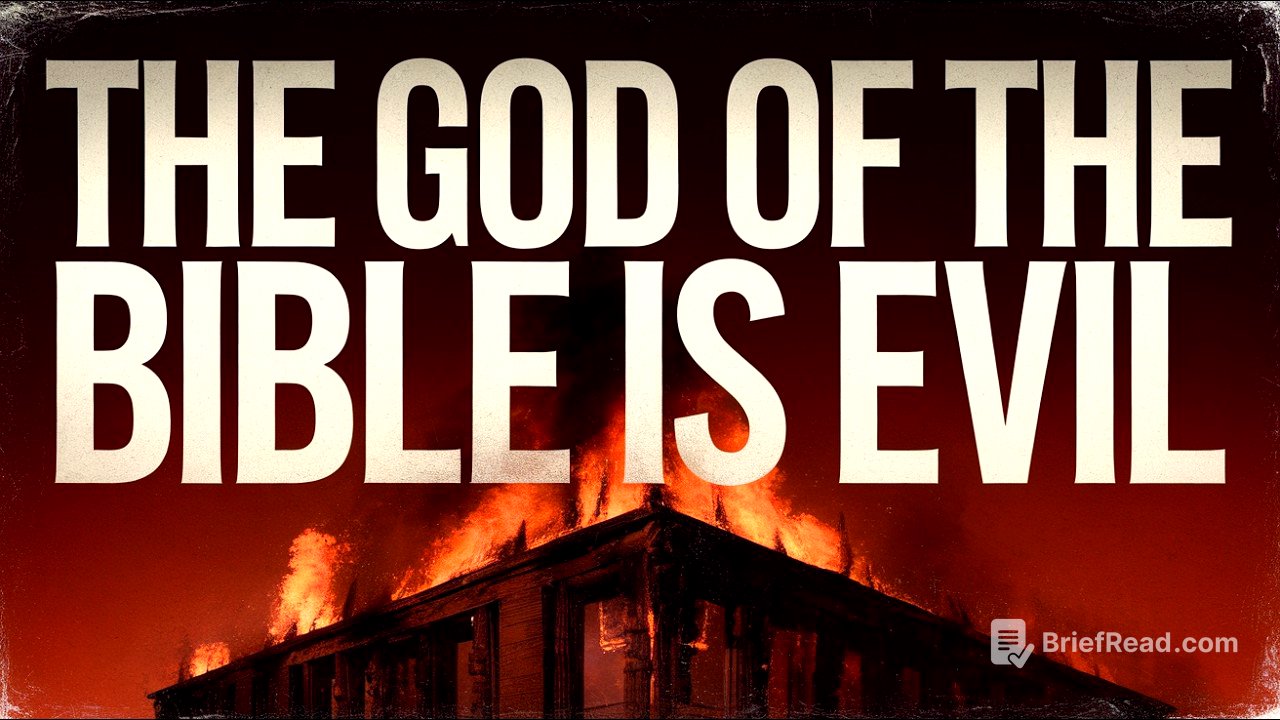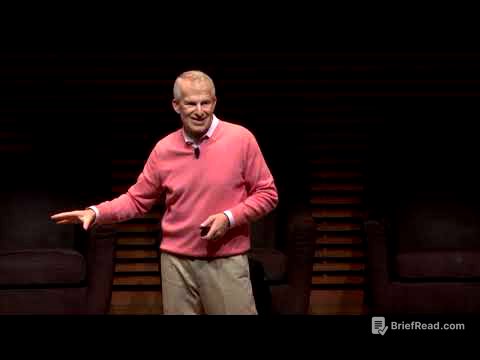TLDR;
The video critiques the morality of the God depicted in the Bible, arguing that his actions and commandments, when viewed objectively, reflect traits of insecurity, violence, and injustice rather than love or wisdom. It challenges the notion that this God is a foundation for morality, pointing out the problematic aspects such as the acceptance of slavery, demands for war, and the concept of eternal punishment. The video suggests that true morality stems from empathy, reason, and experience, and that societies become more just as they move away from strict biblical law.
- The God of the Bible is portrayed as insecure, violent, and unjust.
- Biblical morality is questioned, citing issues like slavery, genocide, and eternal torture.
- True morality is argued to come from empathy, reason, and experience, not divine command.
- The video encourages questioning and critical thinking about religious teachings.
Introduction: Questioning the Morality of the Biblical God [0:06]
The video starts by stating that reading the Bible without prior belief reveals a God who doesn't align with notions of goodness or love. Instead, this God is depicted as insecure, violent, and unjust, even by the standards of the time the texts were written. Examples such as the story of Noah, Abraham, and Job are used to illustrate these points, questioning the morality of a being who inflicts suffering and demands extreme displays of loyalty.
Problematic Actions and Commandments [1:41]
The video highlights several problematic aspects of the God of the Bible, including the permission and regulation of slavery, the treatment of human beings as property, and the lack of emphasis on kindness, equality, and mercy in the Ten Commandments. It argues that the Bible, if published today, would be banned in many countries due to human rights violations. The concept of hell and eternal punishment for disbelief is also criticized as a form of control through fear.
Examples of Divine Cruelty and Injustice [2:58]
The video provides further examples of what it considers divine cruelty and injustice, such as God hardening Pharaoh's heart to demonstrate power through plagues and commanding the Israelites to slaughter entire towns. It emphasizes the constant demand for worship and submission, questioning the nature of love built on fear and the need for constant praise. The video suggests that these behaviors, if found in a person, would be considered dangerous rather than holy.
Original Sin and the Cycle of Control [5:05]
The concept of original sin is critiqued as unjust, as it punishes individuals for the actions of their ancestors. The video argues that the language of religion, including the teachings of Jesus, often revolves around obedience, belief, and submission, perpetuating a cycle of control. It suggests that children are taught these stories before they can critically question them, conditioning them to accept fear as a virtue and hindering their ability to reason freely.
The Bible vs. Modern Morality [6:48]
The video challenges the idea that the God of the Bible is the foundation of morality, arguing that his actions reflect cruelty, favoritism, and indifference to suffering. It points out that the Ten Commandments prioritize loyalty to God over moral rules and that many important values, such as kindness to strangers and equality, are not mentioned. The video suggests that faith discourages questioning and that abusive systems protect themselves by blaming the doubter.
Contradictions and the Nature of Forgiveness [9:24]
The video highlights contradictions within the Bible, such as God being called loving yet acting with rage, and being called just yet punishing the innocent. It questions the need for death as a prerequisite for forgiveness and criticizes the concept of salvation based on someone else's suffering. The video argues that these ideas are tribal, ancient, and deeply flawed.
The Consequences of Belief [11:34]
The video asserts that the God of the Bible is not a God of human rights, liberty, or reason, but rather a God of rules, violence, and unquestioned authority. It argues that morality doesn't come from this kind of God, but from experience, empathy, and reason. The video points out that societies have become more just as they have moved away from biblical law and that the Bible has been used to justify harmful practices such as slavery, segregation, and misogyny.
The God of the Bible as a Reflection of Human Flaws [13:29]
The video suggests that the God of the Bible, when stripped of worship and rituals, resembles the worst aspects of humanity, such as a violent ruler or a jealous king. It criticizes the emphasis on obedience over understanding and the punishment for minor disobedience. The video argues that modern standards would not accept these behaviors and that a system that punishes independent thought is not moral.
The Trap of Divine Design [14:44]
The video argues that the God of the Bible creates humans with inherent flaws and desires, then punishes them for acting on those very traits. It criticizes the defense that one cannot understand God's plan, stating that a moral system that relies on mystery is not truly moral. The video suggests that people have been taught to redefine evil as good if it comes from God, leading to the acceptance of harmful practices.
The God of Control and Its Impact [16:15]
The video characterizes the God of the Bible as obsessed with control, highlighting traits such as jealousy, anger, violence, and the micromanagement of sexuality. It argues that this character is dangerous because people still worship him today, modeling laws and raising children to fear him. The video questions the impact of this fear on individuals and societies, citing examples of exclusion, punishment, and violence justified by religious beliefs.
Questioning and Resistance [17:51]
The video encourages questioning and critical thinking about religious teachings, arguing that a belief system that demands the cessation of thought is afraid of reason. It asserts that morality should inspire thinking, questioning, and caring, rather than submission and fear. The video concludes that the God of the Bible, judged by his actions, is not good, wise, just, or loving, and that such a being would deserve resistance rather than worship.
The Human Capacity for Goodness [18:23]
The video emphasizes that humans are capable of empathy, cooperation, justice, sacrifice, and love without the need for religious threats or promises. It suggests that people are often at their best when acting from conscience rather than fear. The God of the Bible is presented not as a guide to follow, but as a cautionary tale reflecting the fears and power struggles of ancient people.
The Incompatibility of the Biblical God with Modern Ethics [20:16]
The video argues that the God of the Bible is incompatible with modern ethics because he is not guided by reason, fairness, or consistency. It highlights the dangers of reflecting the traits of a vengeful, exclusionary, and controlling god, leading to harmful consequences such as religious wars and discrimination. The video concludes that morality should focus on reducing harm, increasing understanding, and respecting others out of care, not fear.
Conclusion: Moving Beyond Fear-Based Systems [22:42]
The video concludes by advocating for moving beyond fear-based systems and rejecting the need for gods who demand obedience and threaten punishment. It emphasizes the importance of judging systems by whether they help people live better lives and suggests that the God of the Bible fails this test. The video encourages viewers to share the message and think critically about their beliefs.









